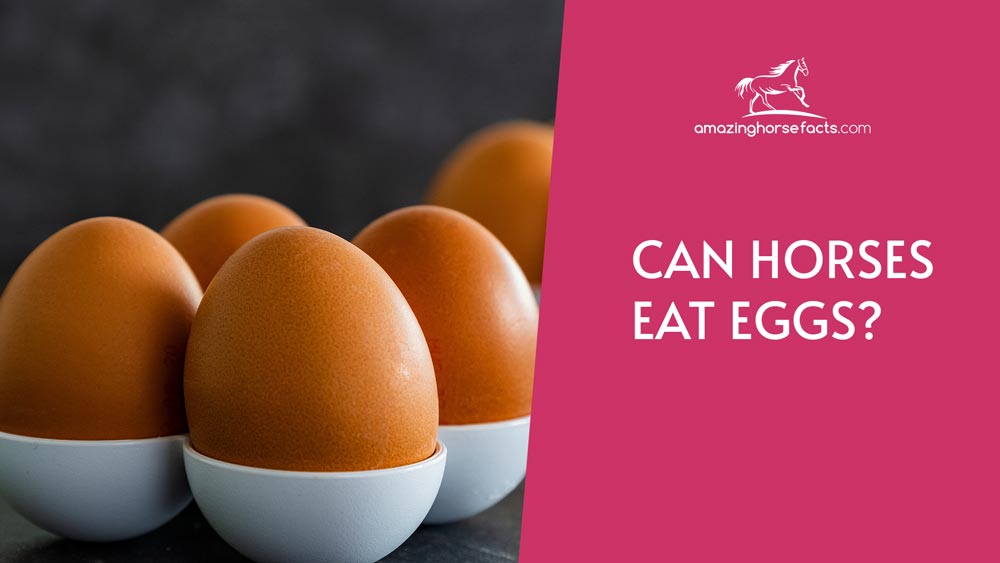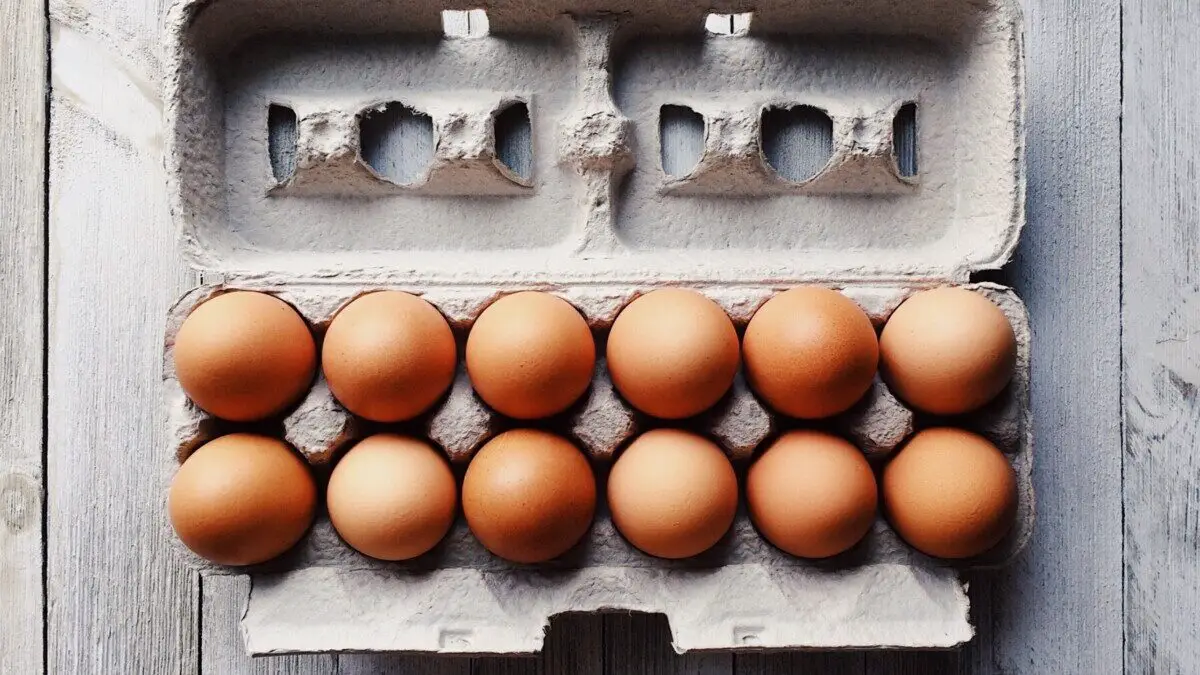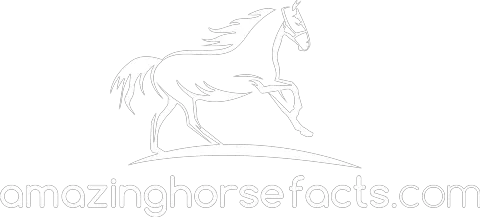Skip To Section

Yes, horses can eat eggs as long as they are fresh. Eggs are a complete protein source, containing all nine essential amino acids. They are packed full of minerals and vitamins, beneficial to supporting a horse’s skin, hooves and giving them a shiny coat. There is no harm in mixing a raw egg into your horse’s feed as an occasional treat.
Giving horses eggs is nothing new. It is a practice that dates back to a time before the modern feeds of today. Back then it was the job of the owner to come up with their own patented blend of raw ingredients to provide their horses with a well-balanced diet. Thanks to its ready availability eggs were one such ingredient.
Now with feed providing a perfect balance of nutrients and proteins, the idea of eating raw eggs feels outdated. Yet it is a practice that has endured and fascinates many horse owners.
But is it safe? Are eggs good for horses? What are the benefits and what is the best method for feeding my horse eggs? Here is a complete and comprehensive guide on everything you need to know about feeding horses’ eggs.
Can I Give My Horse Raw Eggs?
Yes, it is perfectly fine feeding raw eggs to horses. Eggs are full of protein and contain the ideal balance of amino acids and are a great energy source.
When it comes to diet, feeding horses eggs is nothing new. It is a practice that many horse owners swear by. Some crack an egg into the horse’s feed. Others give their horses the whole egg, shell and all, believing the shell acts as a natural calcium supplement.
Can I Give My Horse Cooked Eggs?
If the idea of your horse eating raw eggs is a little unsettling, you can cook them. Boiled eggs are another great option. Boiled eggs will provide the same array of health benefits as raw eggs while completely eliminating the risk of your horse contracting salmonella.
Boiled eggs can be given to your horse whole or chopped up and placed into their feed.
Are Eggs Good For Horses?
Eggs are a superb source of protein for horses and a great way to supplement your horse’s diet. Eggs contain essential amino acids and are an excellent source of vitamins and minerals, including Vitamins B2, B12, D, and A, as well as folate and iodine.
Putting an egg or two into your horse’s diet also has other benefits. They help maintain healthy hooves, and the fat source stored in the yolk of the egg helps give your horse a wonderfully shiny coat. While fats are not a major part of a wild horse’s diet, horses can digest them effectively.
Eggs are an easy way for a horse to get extra calories and help maintain muscle mass and gain weight. This is especially important for racehorses.
Due to their constant training, racehorses eat up to 35,000 calories a day. Being so active, these horses do not have the time or luxury to spend hours grazing in the stables. Thanks to their high caloric density, along with being naturally high in protein, eggs are a great way for horses to get the calories they need quickly.
The method of feeding horses eggs is a tried and tested method that horse owners swear by. It is a practice that has been around for years.
Before feed manufacturers made feeds containing all the essentials for a horse’s dietary requirements, it was the responsibility of their owner to mix their own feed to give their horse a balanced diet. Eggs were a cheap and readily available food source and were an effective way of supplementing a horse’s diet.
Are Eggs Safe For Horses To Eat?

Contrary to popular belief, eggs are safe for horses to eat. Many people believe that because horses are herbivores, that their digestive system cannot handle eating eggs.
That is not the case. Eggs have been a staple of a racehorse’s diet. Just like an Olympic marathon runner, racehorses require a massive amount of calories to sustain their muscle mass and help them recover from training. Eggs were an easy way to get extra calories without having to eat large amounts of hay or feed.
Then there is the issue of salmonella. While this is a risk, it is a tiny one.
The advancement of technology and improved hygiene standards have caused the contraction of salmonella to drastically drop in the United Kingdom and South Korea. To the point where eating raw eggs is now considered safe.
However, there remains a chance that raw eggs can cause salmonella. To reduce the possibilities even further, here are a few steps that you can take:
- Store eggs in a cool, dry place such as a refrigerator
- Avoid using eggs that are past their best before state
- Avoid using no hen eggs (e.g. duck or quail)
- Ensure that the egg is free from any damage or abrasions
Following these steps will further reduce the already small risk of salmonella.
If you want to eliminate this worry completely, you can always boil the eggs. Cooking the egg will have no impact on the nutritional benefits of feeding your horse eggs.
Are Eggs Toxic To Horses?
No eggs are not toxic to horses. With horses being herbivores, many people believe a horse’s digestive system is ill-equipped to digest animal products. That eating raw eggs could have a damaging effect or potentially be toxic.
However, this is not the case. Eggs will have no adverse effects on a horse if consumed in moderation.
Do Horses Like Eggs?
Much like humans, a horse’s love for eggs is down to personal preference. Some horses will happily eat eggs. Others will pay them no attention and will refuse to eat them or spit them out.
The best way to handle feeding your horse eggs is to mix the eggs into their feed or present them whole to the horse. If it wants to, the horse will eat it. If not, there are plenty of other food sources that can help provide the same health benefits as eggs. If your horse does not want to eat eggs, then there is no point in forcing it to.
Will Horses Eat Eggs?
Again this is another issue of personal preference. Some horses are more than happy wolfing down eggs. Others will turn their nose up at them.
The issue of whether horses eat eggs is an issue of debate. Some point to how wild horses eat eggs from birds’ nests as evidence for their love of eggs. Others counter this argument by saying horses are herbivores.
If you are unsure about your horse liking eggs, the best way to find out is a simple taste test. Give your horse an egg, either mix it into their food or give it to the whole. If they eat it, they eat it. If not, there is no point in forcing it.
How Many Eggs Can Horses Eat A Day?
Like with humans, there is no definitive rule when it comes to how many eggs a horse can eat a day. There are records of champion racehorses being fed raw eggs every day. Others see eggs as a treat that only should be given once a week.
Again how many eggs you decide to feed your horses is down to you. But like with everything, moderation is key.
Eggs should be viewed as a supplement, not as a replacement for another food group entirely.
If you feed your horse eggs it should be as a part of a well-balanced diet, one that contains plenty of fiber to improve digestion, starches such as oats, barley, corn, and other cereal grains for slow release energy and protein for the maintenance of muscle mass.
How To Give Horses Eggs?
There are a number of ways to approach giving horses eggs. When feeding horses raw eggs, most horse owners mix the eggs with the rest of their food. Although in some instances, owners have also given their horses the whole egg to varying degrees of success.
If the eggs have been hard-boiled, the eggs can be present to the horse whole, much like a carrot or any other treat. Otherwise, it can be chopped up and placed into the horse feed, much like a raw egg.
Conclusion
There you have it, the definitive guide on can horses eat eggs. High in protein and packed with essential vitamins and minerals, eggs, raw or boiled, are an excellent and safe way to supplement a horse’s diet.
With the modern advancements in technology and with improved egg handling hygiene standards, the fear of your horse contracting salmonella from eating raw eggs is a thing of the past.
While a raw egg here and there is a great way to keep your horse’s hooves strong and coat shiny. They should be considered a treat and consumed in moderation as part of a well-balanced healthy diet.
Related Posts
References
- https://esc.rutgers.edu/fact_sheet/odd-things-that-horses-eat/
- https://www.nhs.uk/live-well/eat-well/eggs-nutrition/
- https://www.equesure.co.uk/contact-us/news-events/what-does-a-racehorse-eat-and-drink/
- https://www.webmd.com/diet/ss/slideshow-eggs-health-benefits
- https://www.westpointtb.com/what-do-racehorses-eat-35000-calories-and-counting/
- https://en.prnasia.com/releases/apac/Salmonella_Has_Not_Been_Detected_in_Korean_Eggs_for_More_Than_10_Years_Why_Are_Korean_Eggs_Salmonella_Free_-191725.shtml
